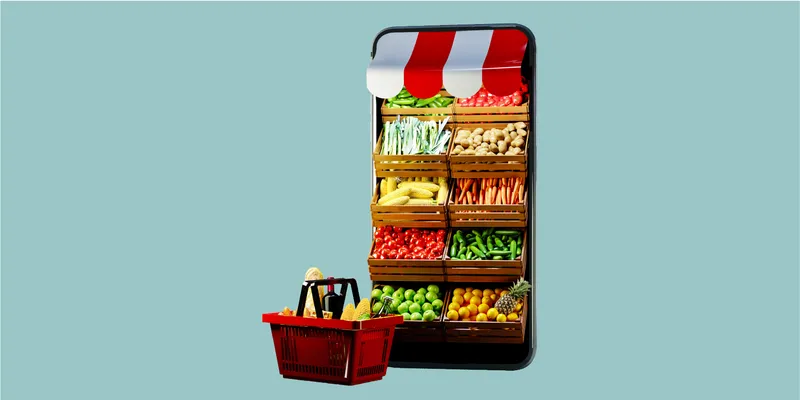This retail tech startup is building a ‘Shopify’ in Indian languages to help MSMEs launch digital stores
‘Dukaan’ tech gained prominence last year after the pandemic forced India’s 65 million MSMEs to go online. Noida-based startup Shoopy has built a multilingual app that enables merchants to do that.
IIT-Roorkee alumni Amit Kumar and Indar Kriplani believed that “Bharat was adopting technology fast because customers wanted the comfort of online shopping”.
This trend was, of course, accentuated by the pandemic in 2020, which forced offline businesses to go digital in order to survive. The big ones managed to make a smooth transition, while the small and medium-sized merchants struggled. They were either tech-illiterate or were unable to afford solutions that would help them go online.
Amit tells YourStory, “While I was at Lenskart, we’d interact with multiple vendors only to realise that they had limited software available to run their business. And those were either expensive or difficult to operate. The divide between theme and big ecommerce players grew more after the pandemic. They lost customers because people moved to online shopping.”
Thus, India’s 65 million-odd MSMEs were staring at an uncertain future. From the neighbourhood kirana store to the meat shop down the road to the local parlour — small merchants needed a quick and convenient way to go digital.

Shoopy founder Amit Kumar and co-founder Indar Kriplani
In June 2020, the duo launched Shoopy, a full-stack retail tech solution to help MSMEs set up digital storefronts (app, website, landing page, etc.) in a jiffy, find and sell to local customers, and grow their business beyond existing channels.
Indar says, “We wanted to solve the problem with simplicity and affordability. Because sellers on the platform have to be successful for us to be successful as a company. The goal was to bridge the tech gap.”
What Shoopy solving for small merchants
The Noida-based startup allows merchants to manage their orders, inventory, catalogue, invoicing, billing, bookkeeping, discounts, offers, and customer database through a simple mobile app, which is available in English, Hinglish, and Hindi interfaces (with Gujarati and Kannada launching soon).
From tracking daily/weekly/monthly sales to onboarding new customers to managing credit (udhaar) through the PhoneKhata app, Shoopy serves as an end-to-end dukaan tech platform for kiranas, corner stores, sweet shops, mobile recharge shops, bakeries, tiffin services, home businesses, hardware stores, and more.
These merchants typically have an annual turnover anywhere between Rs 6-7 lakh and Rs 30-40 lakh, and cannot afford an elaborate enterprise solution.

Shoopy has onboraded 95,000+ merchants in less than a year
Indar explains, “Several solutions exist today, but they don’t serve the localised needs of these very small merchants. Our integrated solution solves invoicing, accounting, selling, payments, and helps merchants grow their business online. They can set up a digital storefront and start fulfilling orders in a few minutes.”
Shoopy also helps merchants with personalisation and branding. It offers deep customisation right down to the fonts and colour templates.
“We present their store, app, domain, SMSes, offers, and everything the way they want it presented. We don’t put our branding anywhere; the merchants are at the forefront. We are just the tech enablers. Think Shopify in Indian languages,” says the founder.
The startup’s end goal is to elevate the technological prowess of small merchants, who form the backbone of the Indian economy, to help them compete with deep-pocketed ecommerce giants in an increasingly digital-first world. You don't need to be a tech expert to operate Shoopy, according to the company.
Merchants can use the app even if they don't have a GST registration for their shop. Additionally, it functions even in low-network areas in small towns.

Shoopy generates over 1 lakh invoices per month
Early growth and funding
Shoopy claims to have aided the digital transformation journey of 95,000+ small merchants within a year of operation, with its GMV crossing Rs 8 crore in May.
In the last 3-4 months, merchant sign-ups increased by 100 percent, as India went into a second lockdown that shuttered shops and limited movement. Shoopy is generating 1 lakh invoices per month, and its retention rate stands at 35 percent.
Amit says, “The last 8-9 months have seen the transformation of the small merchant. Because of the pandemic, they’ve adopted tech very fast. We created instructional videos in local languages to help them get started. Now, they understand what a ‘domain’ is and how they can make their website searchable on Google. They have learnt the value of digital and it will stay with them even after the pandemic.”
Grocery sellers and kiranas form the largest chunk of Shoopy’s customers. Restaurants and catering services are the next big vertical. The startup claims that all merchants have grown their businesses by 40 percent after going digital.

Photo: YS Design
Almost 30 percent of its sellers are women, who are selling beauty products, and setting up jewellery shops, home kitchens, and food delivery businesses. “Women sellers would lose out to the big guys earlier, now they don’t,” Indar states.
Earlier in March, Shoopy raised a seed round of $250,000 from US-based Campanile Investments, Delhi-based Redcliffe Capital, and a clutch of angels, including Ajith Pai of Paipal Ventures. The startup plans to use the capital to do R&D, grow its merchant network, launch new features, and ramp up its team.
Future roadmap and market overview
Shoopy plans to reach over one million merchants, and hit a GMV of Rs 80 crore by the end of this financial year. It will also invest in digital marketing activities to make sellers more aware of the platform.
The startup has also launched a Shoopy B2C consumer app to help people discover local stores. The app lets them place orders for groceries, medicines, books, beauty products, hardware items, etc. and get them delivered at their doorstep.

Grocery stores and kiranas form the biggest chunk of Shoopy customers
Amit says, “There’s a lot of demand for new features. Cataloguing is a challenge because there’s no SOP in India. Everyone sells different products, sometimes even homemade ones. And building a good but economical platform is a challenge.”
Add to that, the intense competition in India’s dukaan tech market. From global giants like Shopify and WhatsApp (Business) to big corporations like Reliance Industries to heavily-funded startups, including Khatabook, OkCredit, BharatPe, Bikayi, DotPe, Dukaan, Aarzoo, and more, everyone wants a slice of the retail tech pie.
The founder reckons,
“About 6-7 players will co-exist in the market. As a platform if you are providing the right services, there will be stickiness. And we have created a product based on our experience in ecommerce and supply chain management.”
With MSMEs generating over 100 million jobs annually, and contributing 29 percent to India's GDP (CRISIL data), dukaan tech has become almost imperative for the sector to survive the pandemic and a potential economic recession.
Shoopy is only getting started.
Edited by Saheli Sen Gupta












